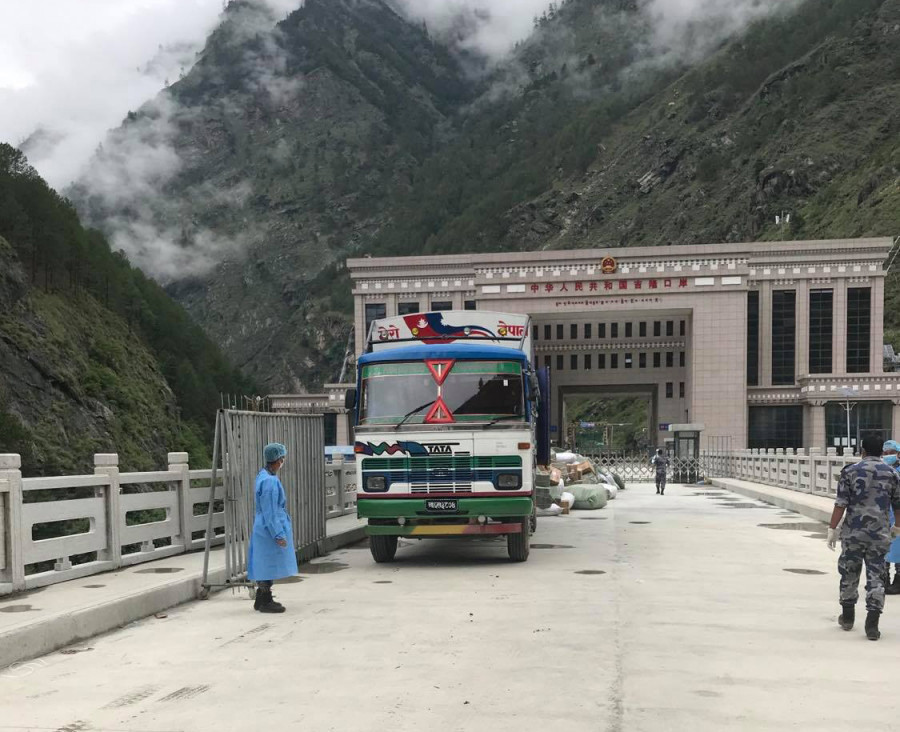Money
Local traders fear they may miss the winter shopping season too
The northern border has reopened, but only a small number of containers are being allowed to pass.
Krishana Prasain
Local traders fear they may miss the winter shopping season too, like they lost the summer and festive shopping seasons due to delayed shipments, as their goods are again being held up at the northern border points.
The northern border with China reopened before the festive season in mid-October after being closed for several months, but only a small number of containers were allowed to pass. Hundreds of container trucks have been stranded on the other side of the border for a year.
“The goods ordered for the winter season are stuck at the transit point,” said Bachhu Poudel, president of the Nepal Trans Himalayan Border Commerce Association. “Not more than four-five containers are arriving daily from the bordering crossings at Kerung and Tatopani.”
According to him, only 10 percent of the shipments have been allowed through.
The two transit points with China had been shut since January 29 to prevent the spread of the coronavirus.
The Tatopani border, which had remained closed since the April 2015 earthquake, reopened on April 8 to allow medicines and health equipment from China to pass. Rasuwagadhi reopened only in the first week of July.
The two border points were opened to one-way traffic, and only four cargo trucks or 120 tonnes of goods were allowed to enter Nepal daily due to virus restrictions as per an agreement between Nepali and Chinese authorities.
Following a rising virus caseload in Nepal, Chinese truckers have been leaving containers at the Miteri Bridge on the border from where Nepali truckers take over.
“Citing safety issues, Chinese authorities are not releasing more than five containers from the border points daily,” he said. “The delayed release of goods has added to the burden of traders due to higher shipping charges and accumulating bank interest.”
Poudel said, “Except for the prime minister, we have appealed to all concerned authorities, but the problem remains the same. We went to the Chinese Embassy to discuss the issue, but they asked us to come through the concerned government channel.”
The government, for its part, says that it has been discussing the trade issue with the related stakeholders, but the outcome has been zero, he said. “We don’t know whether they are making any effort or not,” he added.
Traders said that ordering goods by sea cargo was not viable for small traders as they do not deal in large quantities of merchandise.
According to Poudel, around 70 containers used to cross the border daily from the northern trade point during normal times.
A container takes up to two weeks to reach Kathmandu from the northern border point, and sea cargo takes more than a month, Poudel said. Due to the convenience, traders prefer to import goods by road rather than by ship, he added.
One can order small quantities if you are transporting goods by road, but you have to import in bulk if you want them to be dispatched by sea, he said.
Summer goods that were ordered before the lockdown began are only now starting to arrive in Kathmandu.
Nearly 1,100 cargo trucks were stranded at the northern transit points from January till early July as they were closed following heavy snowfall and subsequent border shutdown by the Nepal government in the wake of Covid-19.
“The increased freight charges have pushed up the prices of goods by 25-30 percent, increasing the burden on consumers,” Poudel said. Traders had to wait for eight-nine months for their shipments to arrive from the northern border, and that added to their costs. Some merchandise also got damaged after being stuck at the border for a long time.
“The price of goods shipped through the Kerung border has risen as the Chinese agent has increased fares threefold. Transportation charges for a container truck may reach Rs1.2 million now,” Poudel said.
Naresh Katuwal, president of the Nepal National Traders' Federation, said that shipments still do not arrive regularly from the northern border.
“More than 100 containers are stranded at the Tatopani point while it has been a year that goods have been stuck at Kerung,” he told the Post.
Neither China nor Nepal seems willing to ease the congestion in cargo transportation, he said. “Readymade garments, footwear and consumer electronic goods are the main imports from China; and when only a few cargo trucks are released daily, you can imagine how many shipments we receive, and what that does to our business,” he said.
Traders are debating whether they should continue importing goods through the northern border because of this recurring transportation problem, he added. Their goods have been stranded at the border for a year now, and their bank interest is piling up, and they still don't know when their goods will be delivered.
There is little chance that the goods on order will arrive from the northern border points in time for the winter shopping season, he said. The freight charges have risen by three times, he said. The government should have intervened but it did not happen.
“We took the issue to the Ministry of Industry, Commerce and Supplies, and they said that the problem would be solved within a few days,” Katuwal said.
Industry Minister Lekh Raj Bhatta said that the Ministry of Foreign Affairs and the ministry’s Bilateral and Regional Trade Division had held secretary-level discussions.
“With rising Covid-19 cases in the country, China is adopting a strict safety protocol. But we are trying to have more cargo trucks released. I have talked with the secretary of the Ministry of Foreign Affairs too, and they said that they would discuss the issue again,” Bhatta told the Post.




 17.9°C Kathmandu
17.9°C Kathmandu















